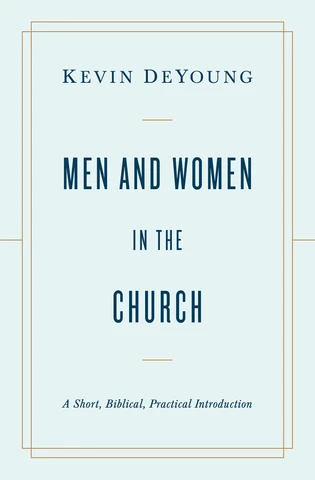
Kevin DeYoung
Reviewed by: Zachary M. Simmons
Men and Women in the Church: A Short, Biblical, Practical Introduction, by Kevin DeYoung. Crossway, 2021. Paperback, 176 pages, $17.99 (Amazon). Reviewed by OP pastor Zachary M. Simmons.
With characteristic clarity and brevity, Kevin DeYoung makes a nuanced contribution to a fraught topic that will reward your careful attention and critical reflection.
DeYoung plainly describes himself as “complementarian,” arguing that the term has valuable intrinsic meaning. DeYoung seems to feel at home in the complementarian mainstream (John Piper is mentioned favorably); however, he is not rehashing old ideas, but offering a fresh voice that seeks to avoid manifold pitfalls in both content and tone.
The book includes both old and new material (it is partly a revision of DeYoung’s out-of-print Freedom and Boundaries, 2006). Part 1: Biblical Exploration, surveys Old Testament history and the Gospels, then ventures a more detailed exegesis of five key Pauline texts. Part 2: Questions and Applications, seeks to answer common objections and offer wisdom for raising boys and girls to be godly men and women. Bavinck admirers will appreciate DeYoung’s extensive interaction with his The Christian Family.
In places, DeYoung engages more or less directly with contemporary discussions familiar to some OPC readers. For example, he acknowledges that “the phrase ‘biblical manhood and womanhood’ has fallen on hard times, and perhaps some of the wounds have been self-inflicted,” though he thinks the phrase “at its best” is still useful (34). He affirms that “manhood and womanhood cannot be reduced to authority and submission” but maintains that authority and submission “are meaningful expressions of what it means to be a man and a woman” (136). In dealing with 1 Corinthians 11:3, he explicitly and thoroughly rejects the “eternal subordination of the Son” (52).
DeYoung makes a concerted effort to emphasize the vast range of opportunities for women’s gifts to be valued and voices heard in the life of the church. He opposes “defaulting to ‘traditional’ women’s roles” on the one hand, though he also opposes the view “that a woman can do whatever an unordained man can do” on the other (94). Thoughtful readers from a range of perspectives will find points of disagreement. In places, DeYoung’s Old Testament exegesis seems strained to fit the “patterns” he educes, and in some of his conclusions he seems to overgeneralize. On the other hand, his advocacy for women (and unordained men) praying and sharing publicly in corporate worship will be moot for churches where only ordained officers speak individually in the worship assembly.
Men and Women in the Church would be more valuable if it confronted more directly the sinful oppression of women that has been committed in the name of complementarianism. DeYoung acknowledges in his introduction that “boneheaded complementarians” exist, “doing cringey, offensive, or genuinely sinful things” toward women in the church (18), but many fine opportunities to confront and correct these problems are missed. Nonetheless, the positive vision DeYoung himself casts is gentle and gracious. He generally succeeds in his goal to be “tender, winsome, and warm … grounded in Scripture and sensitive to people” (131). DeYoung’s exemplary tone and approach are worthy of emulation by future writers on this subject.
December 14, 2025
December 07, 2025
November 30, 2025
November 23, 2025
November 16, 2025
November 09, 2025
November 02, 2025
© 2025 The Orthodox Presbyterian Church